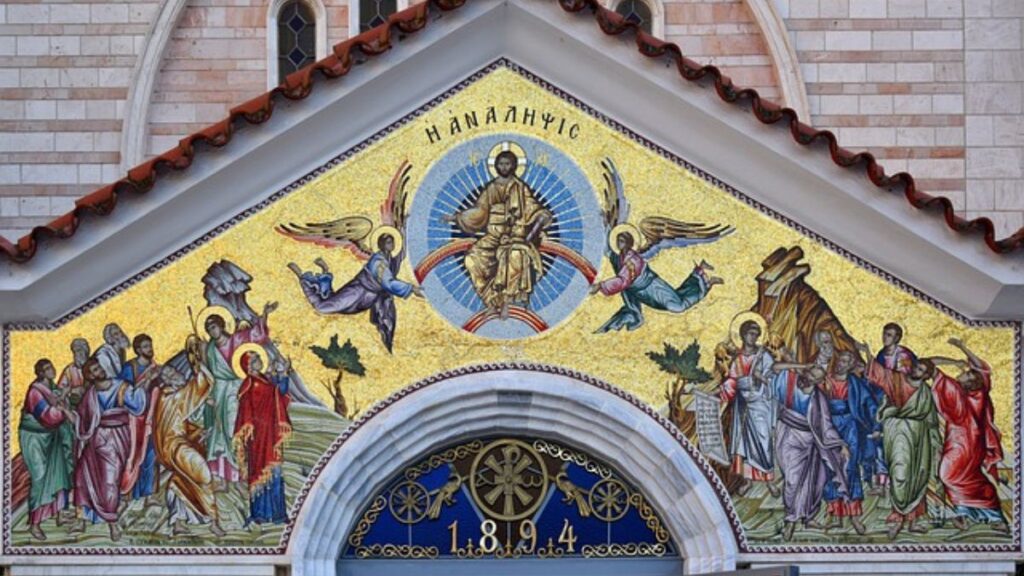Introduction:
Elevating Faith: Exploring the Meaning of Jesus’ Ascension

In the grand narrative of Jesus Christ’s life, his ascension often occupies a pivotal yet understated place. While his birth, crucifixion, and resurrection are widely celebrated and deeply analyzed, the significance of his ascension tends to be overlooked. However, understanding the meaning behind Jesus’ ascension can profoundly impact one’s faith journey. In this article, we embark on a journey to explore the depths of this transformative event and its implications for believers today.
What role does the Holy Spirit play in Jesus’ ascension?
The role of the Holy Spirit in Jesus’ ascension is pivotal and multi-faceted:
- Promise of the Holy Spirit: Before his ascension, Jesus promised his disciples that he would send the Holy Spirit to empower and guide them (Acts 1:4-5). This promise was fulfilled on the day of Pentecost when the Holy Spirit descended upon the disciples, empowering them for ministry (Acts 2:1-4).
- Empowerment for Witnessing: Jesus instructed his disciples to wait in Jerusalem until they received the power of the Holy Spirit, enabling them to be witnesses of his gospel to the ends of the earth (Acts 1:8). The Holy Spirit empowered the disciples to boldly proclaim the message of salvation despite opposition and persecution.
- Continued Presence of Jesus: Through the Holy Spirit, Jesus assured his disciples of his continued presence with them even after his physical departure. The Holy Spirit serves as the Spirit of Christ, dwelling within believers and guiding them in their relationship with God (John 14:16-18).
- Guidance and Revelation: The Holy Spirit also guided the early church in matters of doctrine and mission. The Spirit guided the apostles, revealed God’s will, and enabled them to discern truth from error (Acts 15:28, 1 Corinthians 2:10-13).
- Unity and Fellowship: The Holy Spirit fosters unity and fellowship among believers, empowering them to love one another and live in harmony (Ephesians 4:3). The Spirit unites believers as members of the body of Christ, each with unique gifts and roles to fulfill (1 Corinthians 12:12-13).
In summary, the Holy Spirit played a crucial role in Jesus’ ascension by empowering his disciples for ministry, ensuring his continued presence with them, guiding the early church, fostering unity among believers, and revealing God’s truth to them.
What significance does Jesus’ ascension hold for modern-day Christians?
Jesus’ ascension holds significant implications for modern-day Christians:
- Assurance of His Sovereignty: The ascension of Jesus confirms his victory over sin, death, and the powers of darkness. It assures believers of his sovereignty and authority over all things, including their lives and circumstances.
- Continued Intercession: Jesus’ ascension means that he now intercedes for believers at the right hand of God (Hebrews 7:25). This assures Christians that they have a sympathetic high priest who understands their weaknesses and advocates for them before the Father.
- Empowerment through the Holy Spirit: Just as Jesus promised, his ascension paved the way for the outpouring of the Holy Spirit upon believers. The indwelling presence of the Holy Spirit empowers Christians to live godly lives, bear witness to Christ, and fulfill their mission in the world.
- Hope of His Return: The ascension of Jesus is coupled with the promise of his second coming. Modern-day Christians find hope and anticipation in the assurance that Jesus will return in glory to establish his kingdom and make all things new.
- Commission for Mission: Like the disciples who received the Great Commission before Jesus ascended, modern-day Christians are called to proclaim the gospel and make disciples of all nations. The ascension reminds believers of their mission to be witnesses of Christ’s love and redemption to the ends of the earth.
- Identity as Citizens of Heaven: The ascension of Jesus reminds Christians that their ultimate citizenship is in heaven (Philippians 3:20). It encourages them to set their minds on things above and live as pilgrims on earth, eagerly awaiting the day when they will be united with Christ in glory.
In summary, the ascension of Jesus holds significance for modern-day Christians by assuring them of his sovereignty, providing the Holy Spirit for empowerment, instilling hope in his return, commissioning them for mission, and reminding them of their identity as citizens of heaven.
How does Jesus’ ascension influence Christian views on prayer?
Jesus’ ascension significantly influences Christian views on prayer in several ways:

- Access to the Father: Through his ascension, Jesus opened the way for believers to approach God the Father in prayer with confidence (Hebrews 4:16). His exaltation to the right hand of God ensures that prayers offered in his name are heard and welcomed by the Father.
- Intercessory Role: Jesus’ ascension highlights his ongoing intercessory ministry on behalf of believers. As the ascended Lord, he continually advocates for his followers before the Father, making their prayers effective and powerful (Hebrews 7:25).
- Empowerment through the Holy Spirit: The ascension of Jesus paved the way for the outpouring of the Holy Spirit, who enables believers to pray according to the will of God (Romans 8:26-27). The Spirit helps believers in their weakness and intercedes for them with groans that words cannot express.
- Alignment with God’s Purposes: In prayer, Christians are called to align their desires and requests with God’s purposes and kingdom agenda. The ascension of Jesus reminds believers to pray in accordance with his will, seeking first the advancement of God’s kingdom and the fulfillment of his redemptive plan (Matthew 6:10).
- Hope and Expectation: The ascension of Jesus instills hope and expectation in the hearts of believers as they await his return. Prayer becomes an expression of faith and anticipation, as Christians eagerly await the day when Jesus will come again to establish his kingdom and make all things new.
- Commission for Kingdom Work: Prayer is not only a means of communion with God but also a vital aspect of participating in his kingdom work. The ascension of Jesus commissions believers to pray fervently for the spread of the gospel, the growth of the church, and the transformation of society (Matthew 9:38).
In summary, Jesus’ ascension profoundly influences Christian views on prayer by providing access to the Father, highlighting his intercessory role, empowering through the Holy Spirit, calling for alignment with God’s purposes, instilling hope and expectation, and commissioning for kingdom work through prayer.
Conclusion:
In conclusion, the ascension of Jesus is not merely a historical event but a theological reality with profound implications for believers today. It elevates our faith by reminding us of Christ’s exaltation, the empowering presence of the Holy Spirit, and the promise of his return. As we reflect on the meaning of Jesus’ ascension, may it deepen our understanding of God’s redemptive plan and inspire us to live lives worthy of the gospel.
FAQs
- What is the significance of Jesus’ ascension?
Jesus’ ascension signifies his departure from the earthly realm and his return to the heavenly realm. It marks the completion of his earthly mission, the fulfillment of prophecy, and his exaltation to the right hand of God.
- Why is Jesus’ ascension important for believers?
Jesus’ ascension is important for believers because it assures them of his continued presence and intercession on their behalf. It also heralds the outpouring of the Holy Spirit and provides hope for his imminent return.
- How does Jesus’ ascension impact the mission of the church?
Jesus’ ascension empowers believers through the Holy Spirit to be witnesses of his gospel to the ends of the earth. It marks the birth of the church and underscores the urgency of spreading the message of salvation.
- What is the relationship between Jesus’ ascension and his second coming?
Jesus’ ascension is closely linked to his second coming. Just as he ascended into heaven, he will one day return in glory to judge the living and the dead. The promise of his second coming gives believers hope and anticipation for the future.
References
- Acts 1:9-11 (NIV) – “After he said this, he was taken up before their very eyes, and a cloud hid him from their sight. They were looking intently up into the sky as he was going, when suddenly two men dressed in white stood beside them. ‘Men of Galilee,’ they said, ‘why do you stand here looking into the sky? This same Jesus, who has been taken from you into heaven, will come back in the same way you have seen him go into heaven.'”
- Hebrews 7:25 (NIV) – “Therefore he is able to save completely those who come to God through him, because he always lives to intercede for them.”
- Psalm 110:1 (NIV) – “The Lord says to my Lord: ‘Sit at my right hand until I make your enemies a footstool for your feet.'”
- Acts 2:1-4 (NIV) – “When the day of Pentecost came, they were all together in one place. Suddenly a sound like the blowing of a violent wind came from heaven and filled the whole house where they were sitting. They saw what seemed to be tongues of fire that separated and came to rest on each of them. All of them were filled with the Holy Spirit and began to speak in other tongues as the Spirit enabled them.”
- 1 Corinthians 15:58 (NIV) – “Therefore, my dear brothers and sisters, stand firm. Let nothing move you. Always give yourselves fully to the work of the Lord, because you know that your labor in the Lord is not in vain.”








